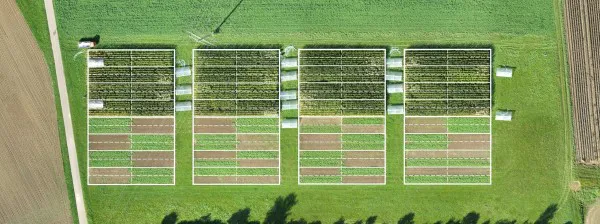A long-term study by Agroscope has for the first time experimentally investigated the ecological, agronomic and economic strengths and weaknesses of four different farming systems. Organic farming is at the top in terms of environmental performance. However, it still lags behind conventional agriculture in terms of yield.
In Switzerland, organic food is on average about 50 percent more expensive than conventionally produced food. Until now, however, it has not been possible to precisely quantify the environmental benefits of organic products. Now, a research team led by Agroscope is providing figures for the first time. In a long-term trial lasting more than ten years, they have systematically determined how four different farming systems (conventional plowing to organic with reduced plowing, see below) affect environmental compatibility, productivity and economy. The results were recently published in the renowned journal Science Advances. Photo: Agroscope, Raphaël Wittwer
Photo: Agroscope, Raphaël Wittwer
Large differences measured
According to the study, organic and soil-conserving farming methods favor those environmental aspects that are important for agriculture - e.g. biodiversity, soil, water and air. On average, organically managed cropping systems are twice as good for the environment as conventional farming with plowing.
"If you look at all environmental impacts, organic is clearly ahead," says study leader Marcel van der Heijden of Agroscope. The most striking differences are in biodiversity. A field managed according to organic standards has 230 percent more above-ground plant species diversity than a conventionally managed field. "Organic and no-till farming are also more beneficial for soil life. For example, we found 90 percent more earthworms in organic plots and as much as 150 percent more in no-till plots," van der Heijden explains.
Less erosion in organic farming
The differences mentioned above exist in all arable crops - mainly because of the use of synthetic chemical pesticides and artificial fertilizers. As the results show, these are also reflected in the ecotoxicity. In organic farming, which does not use synthetic chemical pesticides, it is 81 percent lower.
Another important factor is the use of the plow. "When you rip up the soil, you expose it to erosion from wind and water," says Raphael Wittwer, lead author of the study. Compared with conventionally plowed soils, the reduced plow use and the two organic farming types fared better, with 46 to 93 percent less erosion.
Yield is the Achilles heel of organic farming systems
The long-term trial confirms that organic farming (plowed and unplowed) is less productive. For example, yields were on average 22 percent lower than conventional production methods with plowing. This is partly due to the ban on artificial fertilizers and synthetic chemical pesticides. "Here, organic farming still has great potential for improvement," says Wittwer. This ranges from plant breeding of resistant varieties, to improved biological crop protection, to spatially specific fertilization.
The study shows: All four farming systems studied have advantages and disadvantages. However, from a systemic perspective, organic farming and the soil-conserving no-till method are more balanced in terms of yield and environmental impact. Ultimately, the evaluation depends on how one weights the different ecosystem services and what goals are to be achieved. This study suggests possible directions for action.
Unique long-term study
The trial took place on a field of about one hectare outside Zurich. The field is divided into 128 small plots, each testing a specific farming method. These include conventional farming with plow, conventional farming without plow (no-till), organic farming with plow, and organic with reduced tillage. The crop rotation was: winter wheat, grain corn, field beans, winter wheat, grass-clover (artificial meadow) and again grass-clover (year 6). The trial has been running for twelve years and will continue for at least another six years. "Trials over such a long period of time are very rare in the world and a great strength of Agroscope, as we study the whole system," says van der Heijden. Further studies at farm level and on other sites will complement the present results.
